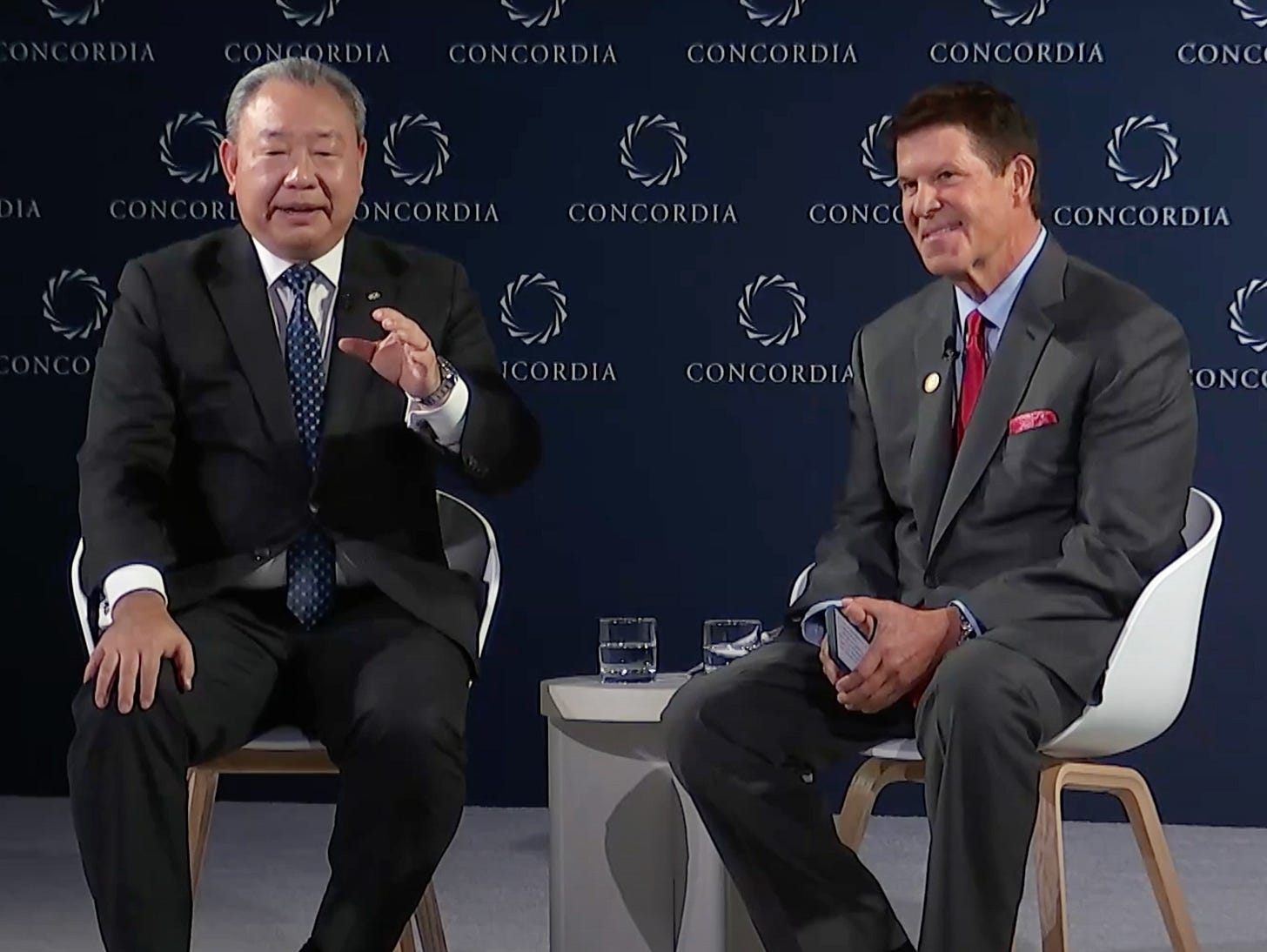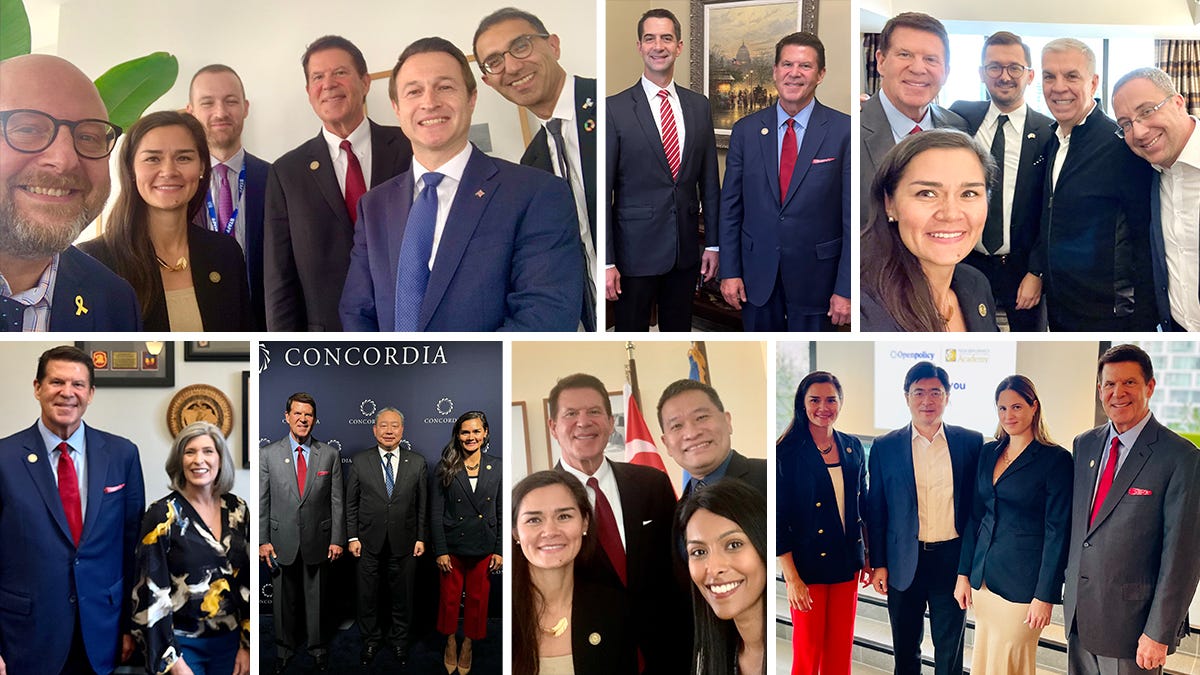Tech Diplomacy Now: Krach Institute Briefs Global Leaders During UN Session and on Capitol Hill
The Krach Institute hosted a series of public and private engagements with world leaders attending the UN General Assembly in New York, as well as with members of Congress in Washington, D.C.
TABLE OF CONTENTS
Tech Diplomacy Updates
Top News of the Week
Latest News
Technology Strategy and Policy
Artificial Intelligence
Telecommunications Networks and Infrastructure
Critical Minerals
Synthetic Biology
Quantum
Advanced Aerospace Technology
Semiconductors and Microelectronics
Energy and Climate
Opinion and Commentary
The Last Word
Keith Krach and Amb. Alexander Yui Discuss Taiwan’s Trusted Brand at Concordia Summit
Taiwan’s Ambassador Alexander Tah-ray Yui joined the Krach Institute for Tech Diplomacy at Purdue Chairman Keith Krach at the 2024 Concordia Annual Summit to discuss Taiwan’s leading role in semiconductor manufacturing, the cross-strait security landscape, elevating Taiwan’s international standing, and advancing freedom through trusted technology.
Watch the full conversation with welcome remarks from the Krach Institute CEO Michelle Giuda.
KITDP Team Engages with Diplomatic Partners from Across the Globe During U.N. General Assembly
During a flurry of briefings with senior government officials, business executives, and civil society leaders in New York and Washington, DC, the Krach Institute delegation, headed by co-founders Keith Krach and Purdue President Mung Chiang, as well as Michelle Giuda, the Institute’s CEO, explored the economic, scientific, and security benefits of accelerating the innovation, deployment, and adoption of trusted technologies.
Top left to right: meeting with the UK delegation, meeting with Sen. Tom Cotton, meeting with the delegation from Romania; bottom left to right: meeting with Sen. Joni Ernst, meeting with Taiwan’s Amb. Alexander Tah-ray Yui, meeting with the delegation from Singapore, co-hosting a reception with OpenPolicy Co-Founder and CEO Amit Elazari.
Top News of the Week – California Governor vetoes AI Safety Bill
California Governor Gavin Newsom vetoed an AI Safety Bill passed by the state legislature and developed by leading AI researchers. Elon Musk supported passage of the law, but it was opposed by many of the largest AI companies and venture capital firms.
Key Points:
The California law passed the state legislature over the objections of Google, Meta, Microsoft, OpenAI, and other large AI companies as it signaled them out and would have made them liable for harms.
Had Gov. Newsom signed the bill into law, it would require the largest AI models – those costing more than $100 million in computing power to train – to take “reasonable care” to ensure they didn’t cause “unreasonable risk of causing or materially enabling a critical harm.”
The law would likely have set standards that the rest of the United States would have followed.
More on Background:
California’s Gavin Newsom Vetoes Controversial AI Safety Bill – WSJ, September 29, 2024
SB 1047: Safe and Secure Innovation for Frontier Artificial Intelligence Models Act. – Digital Democracy, September 3, 2024
DIVE DEEPER: Visit the Tech Diplomacy Academy to understand the fundamentals of AI and the ethical and policy concerns surrounding this technology.
Learn more.
Latest News
Israel begins ‘limited’ ground offensive against Hezbollah in Lebanon – AP, September 30, 2024
Japan Gets a New Leader Who Wants to Remake the U.S. Military Alliance – WSJ, September 27, 2024
The China-Russia Entente in East Asia: Contending with Authoritarian Partnership in a Critical Region – CNAS, September 26, 2024
First Panamax Containership Sprints Across Arctic Reaching China in Just Three Weeks – GCaptain, September 25, 2024
OpenAI to remove non-profit control and give Sam Altman equity – Reuters, September 25, 2024
Russian military plane violates Japan's airspace – Bangkok Post, September 23, 2024
FBI joint operation takes down massive Chinese botnet, Wray says – Cyberscoop, September 18, 2024
Technology Strategy and Policy
India’s tech diplomacy — from Nehru to Modi – Indian Express, September 28, 2024
China tightens military-civilian export controls ‘just in time’, experts say – SCMP, September 23, 2024
U.S. Research Aided Chinese Military Technology, House Republicans Say – NYTs, September 23, 2024
Microsoft, G42 Deepen Ties with Two AI Centers in Abu Dhabi – Bloomberg, September 17, 2024
India Has Chip Dreams. What It Needs Is a Strategy – Bloomberg, September 15, 2024
Artificial Intelligence
China is churning out AI research but ‘decoupled’ from global networks, report finds – SCMP, September 25, 2024
Meta has a major opportunity to win the AI hardware race – The Verge, September 21, 2024
A.I. Pioneers Call for Protections Against ‘Catastrophic Risks’ – NYTs, September 16, 2024
China claims breakthroughs in autonomous vehicles – Defense One, September 3, 2024
Telecommunications Networks and Infrastructure
Australia should seize the chance to be an undersea cable hub for the region – The Strategist, September 25, 2024
Biden Administration Proposes Ban on Chinese Software in Vehicles – NYTs, September 23, 2024
Inside the US push to steer Vietnam's subsea cable plans away from China – Reuters, September 18, 2024
TikTok Is Becoming a Popular News Source for American Adults – Bloomberg, September 18, 2024
Critical Minerals
This $2.4 Billion Lithium Mine Is Caught Between Russia and the West – Wall Street Journal, September 30, 2024
International effort launched to crack China dominance of critical minerals – Nikkei Asia, September 24, 2024
Western nations join forces to break China’s grip on critical minerals – FT, September 23, 2024
Chinese investor steps in to block Paladin’s Fission Uranium buy – Mining.com, September 16, 2024
US Allies Struggle to Break China’s Dominance of Rare Earths – Bloomberg, September 16, 2024
Synthetic Biology
The Strategic Imperative of Biotechnology: Implications for U.S. National Security – CSIS, September 27, 2024
Two Nobel Prize winners want to cancel their own CRISPR patents in Europe – MIT Technology Review, September 25, 2024
OpenAI acknowledges new models increase risk of misuse to create bioweapons – FT, September 13, 2024
AI-Made Bioweapons Are Washington’s Latest Security Obsession – Bloomberg, August 2, 2024
Quantum
The Quantum Computing Arms Race Is Accelerating – Bloomberg, September 27, 2024
Prioritization, agility key to post-quantum standards implementation, US officials say – FedScoop, September 13, 2024
Boeing to launch space-based quantum demo in 2026 – Defense News, September 10, 2024
Advanced Aerospace Technology
Russia has secret war drones project in China, intel sources say – Reuters, September 25, 2024
China’s GJ-11 stealth drone sightings hint at future role as fighter jet ‘wingmen’ – SCMP, September 16, 2024
Semiconductors and Microelectronics
China, South Korea, Taiwan to spend most on chip equipment 2025-2027, industry body says – Reuters, September 26, 2024
Biden, Modi Announce Plans for a New Chip Plant in India – Bloomberg, September 23, 2024
Potential projects in the United Arab Emirates could be worth more than $100 billion, though major hurdles remain – WSJ, September 22, 2024
Taiwan chip industry suppliers set sail for Japan's 'Silicon Island' – Nikkei Asia, September 18, 2024
Pentagon Doles Out $269 Million for Military Chip Research – Bloomberg, September 18, 2024
Apple Mobile Processors Are Now Made in America. By TSMC – Tim Culpan’s Position, September 17, 2024
Energy and Climate
Canada considering banning China-made software in EVs, says Freeland – Reuters, September 24, 2024
How China is becoming the Saudi Arabia of renewables – SCMP, September 20, 2024
Opinion and Commentary
Humanoid Robots Are the Next Threat from China – Senator Katie Britt and Jacob Helberg, Wall Street Journal, September 26, 2024
To compete with China on AI, we need a lot more power - Daniela Rus and Nico Enriquez, WaPo, September 24, 2024
The Intelligence Age – Sam Altman, September 23, 2024
The U.S. Military Is Not Ready for the New Era of Warfare – Raj Shah and Christopher Kirchhoff, NYTs, September 13, 2024
Our Moonshot Moment Is Here – Nadia Schadlow and Craig Mundie, Real Clear Defense, September 10, 2024
The Last Word
“I don’t think Japan is a truly independent nation yet.”
Prime Minister of Japan Shigeru Ishiba referring to his proposal of a more balanced Japan-U.S. security alliance.
About: Tech Diplomacy Now
The Krach Institute for Tech Diplomacy at Purdue is the world’s preeminent trusted technology accelerator. As the leader of the new category of Tech Diplomacy, the Institute integrates technology expertise, Silicon Valley strategies, and foreign policy tools to build the Global Trusted Tech Network of governments, companies, organizations and individuals to accelerate the innovation and adoption of trusted technology and ensure technology advances freedom.





